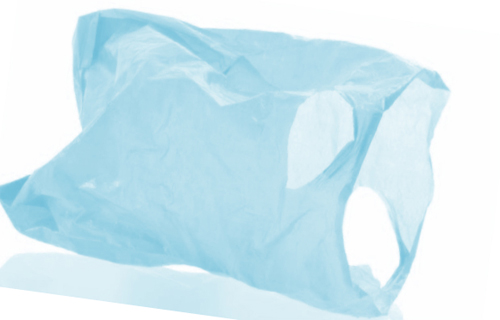Last month, San Diego became the 150th city in the state to ban single-use plastic bags. Passage of a bag ban by the city council was viewed as a long overdue achievement; Solana Beach was the first in the county to pick up the trend back in 2012. But hang on. In November, all Californians will vote on two plastic bag-related propositions that will affect all cities, regardless of whether they already have an ordinance in place.
The ban should have been enacted in 2014 when Governor Jerry Brown signed Senate Bill 270 into law. But the effort was negated by the plastics industry, which organized under the American Progressive Bag Alliance. The APBA paid to acquire enough petition signatures to postpone the ban until it received voter approval, which allowed the plastics industry to profit during those intermediary months.The single-use plastic bag ban will appear on the ballot as Proposition 67, a referendum that was supported by nearly 60 percent of potential voters in 2014, according to a study by USC and the Los Angeles Times. Like the new city ordinance, the law would disallow grocers from providing single-use plastic bags at the checkout counter. Instead, reusable bags would be encouraged and available for purchase, and paper bags would be sold for a minimum of 10 cents each.
“They were in a position where they were about to lose $200 million if the law went into effect as it should have,” said Roger Kube, former chair of the Surfrider Foundation’s San Diego Chapter. “So they were able to spend 3 million bucks to profit about another 200 million in the meantime of the 22-month delay.”
During the months that will lead up to the election, Kube expects the APBA to continue to pour millions more into skewing public opinion. Cue Proposition 65, an initiative on the November ballot that was funded by the APBA. Prop 65, also known as the Environmental Fee Protection Act, would divert the 10 cents paid for paper bags “into a special fund administered by the Wildlife Conservation Board to support specified categories of environmental projects,” according to the California Secretary of State’s website.
In a recent press release, APBA Executive Director Lee Califf argued that the plastic ban has “never been about protecting the environment…This measure gives voters the opportunity to make sure that any state-mandated fee will go to environmental causes.” Although this initiative sounds rational on the surface, the East Bay Times called it “one of the most disingenuous ballot measures in state history.” The California Grocers Association, Surfrider Foundation and other key environmental groups oppose Prop 65 because, while possibly helping the environment, it would undermine the purpose of the paper bag tax.
The 10-cent paper bag charge has two functions. One is to deter shoppers from switching from plastic to paper bags, which happened when San Francisco first spearheaded the movement in 2008. Once the ordinance was amended to include the tax, the city saw an overall reduction in all single-use bags. This was further exemplified in Los Angeles, which saw a 90-percent decline of plastic and paper bag sales after the ban’s implementation.
“Even though the requirements of the paper bag include a certain percentage of recycled content, and they’re better than plastic from a lifespan standpoint, the 10-cent fee does work as an incentive in order to motivate people to bring their own reusable bag,” Kube said.
Secondly, the tax buffers the financial burden on grocers who now have to provide paper bags, which cost about 10 cents, whereas plastic bags cost a penny. Under Prop 67, grocers keep the tax to cover that cost. Most plastic bag bans, including California’s referendum and San Diego’s ordinance, also require that grocers provide free paper bags for shoppers who qualify for government food assistance like CalFresh (previously known as food stamps). This adds an additional expenditure for grocers, which was damaging in San Francisco. “Based on the California Grocers Association, San Francisco grocers were losing about 60 thousand dollars a year because of the increased expense because of their paper bag cost,” said Kube. In directing the tax to an environmental fund, grocers all over California would suffer similarly, which would garner a snowball effect of dissatisfaction for the bag ban.
“Prop 65 really is a cynical ploy brought about by the plastics industry to either confuse voters, frustrate grocers or divide the grocers and the environmental community on this,” Kube said. “It’s also a distraction to confuse voters from the larger issue of supporting Prop 67 and upholding California’s landmark single-use bag law.”
Some politicians argued that cities should wait until November ballots are cast on the issue to keep from layering up on state and city regulations. Since San Diego already has an ordinance on the way, the statewide plastic bag ban would have a minimal effect on the city, other than bumping up the implementation date. Given that the ordinance is approved on its second read, large-scale grocery stores would have a grace period that lasts until about February, while smaller businesses would have until September 2017 to adjust. If the state initiative passes in November and the ban becomes effective immediately— which is currently up for debate—it would force all grocers to comply sooner. Although an earlier start date is beneficial from an environmental standpoint, Kube said it makes the transition more challenging for grocers.
The Oceanside City Council is scheduled to vote on a ban August 10. City Councilmember Esther Sanchez said the ordinance mimics the statewide ban as closely as possible to help ease the transition.
“We’re all looking forward to a positive vote,” Sanchez said. She plans to approve the ordinance alongside Mayor Jim Wood and Deputy Mayor Chuck Lowery, who initially presented it. “Why wait for Californians to decide for Oceanside,” Kube said. “Oceanside’s mayor and council can decide and they should.”
However, they do expect opposition from the two other council members, citing philosophical differences. “There are some people who, no matter what it is, don’t like a government mandate telling people what to do, no matter the benefits for society as a whole,” Kube said. “In their eyes, they’re interfering with business, but this law has business’ support. It’s not often that you get the environment and business communities on the same page on an environmental issue and here we do.”
There are a few plastic bags that are exempt from city and state regulations. Grocery stores will still provide the handleless plastic bags used for loose produce and meat. Basically, the shopping experience will remain unchanged until checkout.
“People who don’t want the inconvenience of bringing a recyclable bag or using it for their dog, it’s an example of how our society thinks it needs everything now,” said Kube. “It’s that mentality about convenience that has gotten us into this situation of plastic pollution in the first place.”
Website:www.sdcitybeat.com




